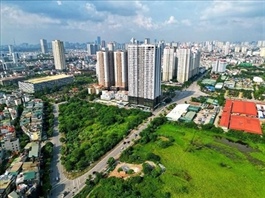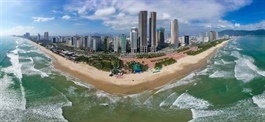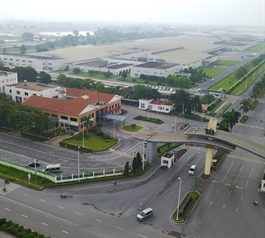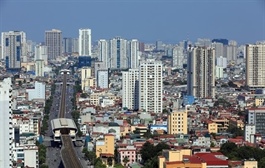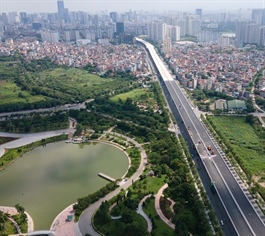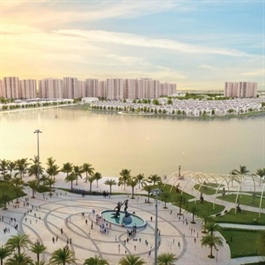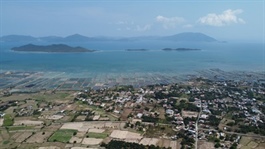Vietnam to boost sustainable industrial park development
Vietnam to boost sustainable industrial park development
There are currently 418 industrial parks in Vietnam, covering an area of about 89.2 thousand hectares, of which 298 are in operation and 120 are under construction.
Awareness of sustainable industrial park development in Vietnam is still low, with up to 50% of industrial park representatives responding to a survey saying they had never heard of the concept of sustainable industrial parks.

Haiphong City's Nam Cau Kien Ecological Industrial Park. Photo: Nam Cau Kien IP |
These results were unveiled last week at a forum on "Fostering Sustainable Development of Industrial Parks in Vietnam".
Using an economic, environmental, social and governance (EESG) framework of 19 key indicators, the Vietnam Business Council for Sustainable Development (VBCSD) under the Vietnam Chamber of Commerce and Industry (VCCI) conducted a survey of 118 industrial parks across the country as part of the Initiative for Sustainable Trade in Vietnam (IDH Vietnam).
Speaking at the event, Nguyen Quang Vinh, Vice Chairman of the VCCI, said that 30% have some understanding of the concept of eco-industrial parks and 20% have a clear understanding that sustainable industrial parks require balanced development across all four pillars of the EESG.
Of the 298 active industrial parks, 272 have wastewater treatment facilities that meet environmental standards (about 91.3% compliance), according to the VCCI report.
Tran Thi To Loan, Deputy Director of Sao Do Group and investor in Nam Dinh Vu Industrial Park, Haiphong City, explained that industrial parks used to focus on maximizing profits and economic growth, with little emphasis on environmental protection or social welfare.
The sustainable industrial park model is currently being designed and managed to integrate economic development, environmental protection and social responsibility for sustainable development, she added.
However, the process of “greening” industrial estates faces many difficulties, from financial constraints to investor capacity and ambiguous legislation.
"Government Decree 35/2022 provides a specific criterion for the classification of eco-industrial parks, which requires that 20% of the companies in the park engage in cleaner production. However, it does not define what is meant by 'cleaner' or 'more resource-efficient'," she said.
The research found that the adoption rate of EESG development policies in industrial parks remains low. Only 39% of the companies surveyed have risk management policies to ensure compliance with environmental legislation, while a further 21% have similar policies for social compliance, 10% have policies to promote circular economy practices, and 13% have digital transformation policies.
There were only 22% of industrial estates have international management system certification and 77% lack company-level audit information on financial, social and environmental aspects.
According to Vinh, the study revealed a number of shortcomings regarding awareness, policy development, and management of industrial parks that align with sustainable development.
"Therefore, Vietnam needs policies and measures to promote the construction and operation of sustainable industrial parks.
Businesses in industrial parks contribute around 50% of the country's total export turnover, helping Vietnam to run a trade surplus rather than a trade deficit and making a significant contribution to the national budget.
The figures above demonstrate the critical role of industrial parks in Vietnam's socio-economic landscape. The sustainable development of industrial parks will also significantly contribute to meeting commitments to achieve net zero emissions by 2050.
Accelerating the development of eco-industrial parks
Vuong Thi Minh Hieu, Deputy Director of the Department of Economic Zones Management under the Ministry of Planning and Investment (MPI), shares this view and believes that the transition to a green and circular economy in industrial parks is one of the solutions to mitigate the environmental impact of industrial activities, reduce resource wastage and promote sustainable growth.
She suggested that enterprises in industrial parks should take the initiative to invest in and adopt efficient resource use and cleaner production solutions. They should also engage in industrial symbiosis to reduce input costs through affordable raw materials, minimize operating costs and enhance their competitiveness.
In the long run, the transformation of conventional industrial park models into eco-industrial parks will help to attract new waves of high-quality investment. Priority support is given to eco-industrial parks and enterprises regarding information, scientific and technological advancement, technology, facilitation of export of goods, brand promotion and participation in value chains.
Hieu stressed that preferential access to credit from banks and financial institutions and investment incentives will also be a priority.
According to Nguyen Quang Tuyen of Hanoi Law University, to speed up the process of "greening" industrial parks and make them more effective, it is necessary to improve the legal framework and remove obstacles to investment and development in industrial parks as soon as possible.
"Filling legal gaps (such as the Real Estate Business Law 2023, which does not directly regulate the industrial park segment) and creating attractive mechanisms for investment in industrial parks are also crucial," he said.
Tuyen added that it is essential to strengthen effective government management of industrial parks, ensure a coherent link between industrial park planning and urban development, develop comprehensive services, and unify planning from national to regional and provincial levels.
Hieu from the MPI also explained that the Ministry of Planning and Investment, with the support of international organizations, has implemented two phases of eco-industrial park development, following a similar model to South Korea.
He emphasized the crucial role of the provincial People's Committees in supporting investment in the construction and upgrading of technical and social infrastructure inside and outside the industrial park fences.
"This is an important factor in facilitating connectivity and the roll-out of eco-industrial park initiatives, as well as the transfer of advanced technologies within industrial parks," she added.
In addition, businesses need to cooperate to share production infrastructure and reuse materials. They can also work with third-party companies outside the industrial parks to create industrial symbiosis.
"Provincial and municipal industrial park management boards can outsource construction, information provision, connectivity and advisory services in implementing eco-industrial parks for public entities. It's significant potential for developing green and sustainable industrial parks," said Hieu.







